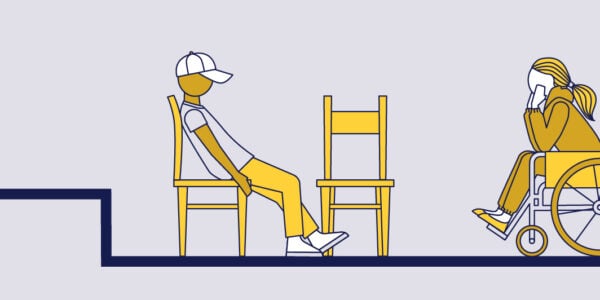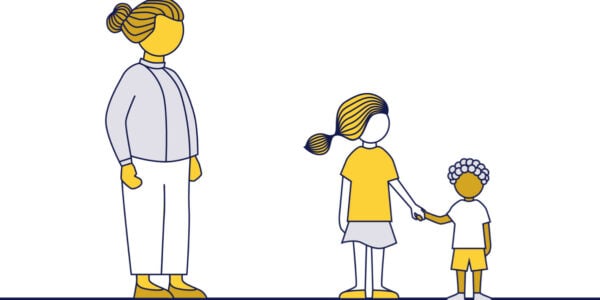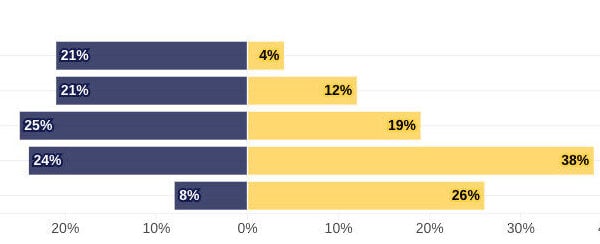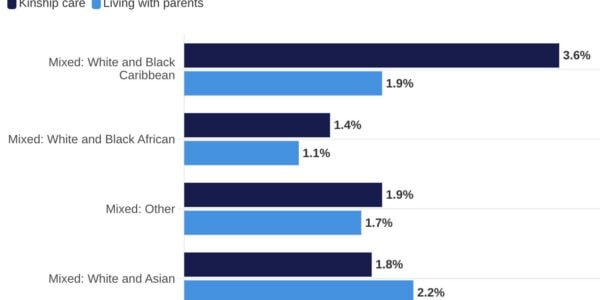Tayo Igbintade is one of a growing number of parent-to-parent advocates in Southwark, London. Since 2022, she has been drawing on her lived experience of children’s services to support other parents and carers in child protection conferences, and meetings with social workers. “We’re like the bridge between the social worker, children’s services, and the family,” she explains. “There’s great benefit when the parents and social work team work well together.”
The role of peer-to-peer parent advocates
Peer parent advocates like Tayo are increasingly in demand in Southwark. Advocates provide emotional support to parents, help them navigate the child protection system, understand their rights, and ensure that their voices are heard.
The 2022 Independent Review of Children’s Social Care in England drew a link between engaging parents effectively and positive and safe outcomes for families. It found “transformational examples of parental representation and support that have kept children safely with their families,” which it recommended should be adopted nationally.
How peer advocacy has evolved
But despite the growing evidence of the benefits of parent peer advocacy, it is only offered by a few local authorities and organisations. “It still feels like an emergent practice,” says Tim Fisher. As a social worker in Camden, Tim helped to establish one of the first peer parent advocate programmes in England. It originated in a monthly coffee morning group that he set up in 2014 for parents and other community members with experience of the child protection process.
“It was quite old school at the beginning … coffee, biscuits and pastries,” he says. “The people that came to that group were often bringing their concerns, things that they felt hadn’t been done well, or pressures that they felt while being part of that process.”
As well as sharing and listening to each other’s experiences, the group started to think about what should be done differently in future. “One thing that bubbled up all the time was the notion of having some extra support for parents. Somebody alongside them as they step into these spaces, the child protection conference, the core group meeting, the meeting with social workers,” he says. “And then it was like: well, what kind of support is this? And there was quite a strong feeling in the group that it should be somebody that’s been through it themselves.”
Five years after the coffee mornings began – “we drank a lot of coffee” – the parents from the group carried out a co-designed research project with professionals, ‘Camden Conversations’. One of its main recommendations was peer parental advocacy.
Kar-Man Au joined the group at the beginning and took part in the research. “Parents said: ‘We need somebody to help us to navigate this process,’” she said. “For professionals, we also heard that that they need someone as a bridge, someone who understands both sides.”
Kar-Man is now a peer parental advocate and the coordinator of the Family Advisory Board in Camden. For her, having someone with lived experience in that role “just makes sense”. “They understand the process, they understand the language, they understand how to work with professionals. That would have benefits to parents because we wear the same shoes,” she says. “If you give a professional advocate, they might know all everything by the book, but the feeling is different.”
It was quite old school at the beginning … coffee, biscuits and pastries. The people that came to that group were often bringing their concerns, things that they felt hadn’t been done well, or pressures that they felt while being part of that process.Tim Fisher, social worker in Camden

Recruitment and training
Kar-Man believes strongly that “not everyone could be an advocate”. “You might have the passion, but you might not be ready. I’m not trying to put people off, but you should have had time to heal and you shouldn’t be triggered easily,” she says.
The process by which advocates are recruited and trained is important, says Jacqui Cox. Jacqui is the family inclusion coordinator at Southwark Council and has run the parent advocacy service since it began in 2020. “We have interviews with myself and also someone from our in-house clinical team to understand what their involvement [with children’s services] has been. How long had it been since they had finished that involvement? What was the outcome? We try not to set specific limits around that, because we’ve been quite flexible about the experience people can have,” she explained.
“The clinical team are very much interviewing from a sense of: how have they processed and made sense of their own experience, and how might that feel for them to be back in that environment with professionals?”
Cinthia Damian was part of the first cohort in Southwark. Like Tayo and Kar-Man, she was motivated to help other parents feel less fearful and confused in their experience with children’s services. “I had a meeting with a social worker, I had to go into the office, and I was asked to sign something. And until this day, I don’t remember what I signed, because I was so nervous,” she remembers.
The group received training in key aspects of child protection and the main acts that underpin it, data protection and studied for a Level 2 qualification in advocacy, which was provided by an external organisation. They also carried out roleplays and sat in on meetings as observers, before taking on their first referrals.
Cinthia said that the group faced some challenges in the early days. “It was at the beginning, with professionals not knowing our role very well,” she says.
In Camden, Kar-Man experienced similar barriers when launching their peer advocacy service. “We needed to do a lot of work to help staff know what this is,” she says. “Then they will more openly make referrals.”
You might have the passion, but you might not be ready. I’m not trying to put people off, but you should have had time to heal and you shouldn’t be triggered easily.Kar-Man Au, coordinator of the Family Advisory Board, Camden
Encouraging effective engagement
When the advocates receive a referral, they first send a text message or call the parent to explain who they are, and how they can help.
Kar-Man describes this initial contact as “crucial”. “You need them to feel comfortable, to trust you and be informed,” she says. Many are initially wary, seeing her as “another person to speak to from the council.” But once she explains that her role is to support them, and that she has also had experience of children’s services, the vast majority go on to accept her help.
Kar-Man sees her role as fostering empathy and engagement between parents and social workers – not trying to bring about a compromise. “I think a lot of issues are about communication and transparency,” she says. “I think fear is the main barrier for the communication breakdowns, from social workers and parents. We need to break down the fear to communicate properly.”
Jacqui agrees. “[Parents] feel like everything that’s being asked is a test and there’s a right answer to give. They’re afraid to say, ‘I don’t understand’. They’re afraid to say, ‘I don’t agree’. What we see with the advocates is, because they’ve been through it themselves, there’s a very high level of trust that the parents have in them in a way that they don’t have of other professionals,” she says.
“It’s encouraging parents that they’re allowed to have a voice in that process. And actually, it’s really helpful if they do have a voice in that process, because they know their children best. Social work is predicated on this idea of we need families to be open and honest, but so much of how processes work and systems work don’t encourage that at all, because people are so fearful.”
Tayo helps to reassure these parents, many of whom are worried about speaking up at child protection conferences. She tells them: “We can have a discussion beforehand, once we’ve seen the report, and you can tell me everything you want to say. When it’s time, I can say that for you. Or you can speak, but because we’ve discussed this beforehand if there’s anything that you’ve forgotten because you’re nervous or you’re intimidated, I can support you with that.”
For other parents, their worry can be expressed as volatility. “They’re usually the ones who feel they haven’t been heard over the years. So they’re very reactive. And I’m there to explain to them: I understand what you’re going through,” she says. “But your aim is that you don’t want these people involved in your life anymore, and the best way to do that is to stay calm. Listen to what they say, work with them with the best of your ability. Once they see that you’re cooperating and changes are being made, then you’re more likely to get the outcome that both of you want.”
Tayo, Cinthia and Kar-Man say that the vast majority of parents are very appreciative of their support. “They say that they feel like someone’s in their corner,” Cinthia says. “Parents feel more empowered. They feel calmer.” She has seen how this has led to better outcomes for families. She remembers one case where a mum was refusing to attend a child protection conference. With Cintha’s support, she attended the conference and was able to voice her concerns and secure the support she needed.
“I feel that that’s really positive, because if the mum hadn’t gone into the conference, it could have been another outcome,” Cinthia says.
Organisations that support parents report similar benefits. Diana Skelton, Head of ATD Fourth World’s Giving Poverty a Voice Programme, says: “Parent advocates hear this from social workers and from judges, that very often, things go better when the parent-to-parent advocate is in the room.” Tammy Mayes, the co-chair of the Parent, Family and Allies Network (PFAN), is also a parent advocate and parent with lived experience. She says that PFAN does not have the capacity and resources to actively work with parents who need parent advocacy but will direct parents towards peer parental advocacy programmes wherever possible. “If we know something is in the area, then we’ll tell the parent,” she says. “PFAN promotes parent advocacy and gets the message out there with webinars and parent and professional meetings. We help others set up parent advocacy – and part of that is to make sure there will be support for parent advocates because they need support too.”
It’s not just the families who benefit. “Social workers have come to see our value,” Tayo says. “Working with tricky parents, tricky families, we’re like the mediator. When the parents say, ‘They’re this, and they’re that’, I’m like, ‘Actually, no, that’s not the situation. This is why they’re doing this, or this is why they can’t do that.’”
They say that they feel like someone’s in their corner. Parents feel more empowered. They feel calmer.Cinthia Damian, part of the first cohort in Southwark
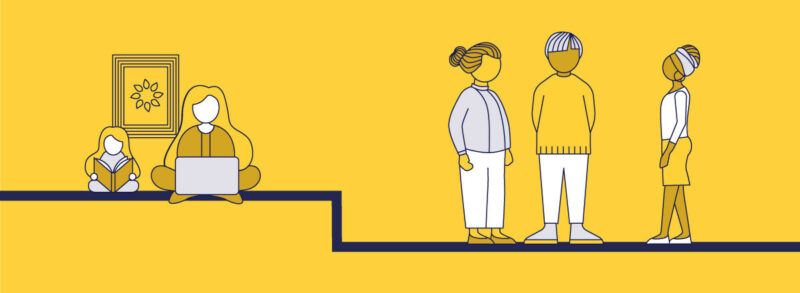
Advantages – and challenges – for advocates
The advocates say that they find helping other parents rewarding and fulfilling. Cinthia’s confidence has grown since becoming an advocate. “At some point I was very careful with what I said or how I said it, but now I feel like, I will say what the parent wants me to say, because that’s my role. And I say it very confidently.”
At first, advocates in Southwark were taken on as volunteers but as demand for their support grew, they moved to find an employment model that would not interfere with universal credit payments or part-time work. They are now employed as agency workers. Tayo, who also has a part-time job as an interpreter, says there can be issues around parents’ expectations about the availability of their advocates, but that she works to establish boundaries by dedicating certain days to her advocacy work.
Kar-Man feels strongly that advocates should be paid, and for it to be considered a professional role. “They need to have organisational skills, communication skills. You can’t just go: ‘Oh, I’m a parent advocate, because I have the experience,’” she says. “You need to attend meetings on time, just like you’re going to work. And I think it’s very important I respect that, because I’m serving another person.”
What if parents don’t want to listen or engage? Does she find this frustrating? “I’m just alongside them to share my experience and help them to analyse the situation. They make the decisions,” says Kar-Man. “I need to not think about me, me, me all the time, and to know my role.” She says that earlier referrals increase her ability to support parents. “I don’t like late referrals,” she says.
Amongst professionals, although the advocates find their role more widely appreciated, Tayo says that some chairs are less receptive to their inputs. She describes them as “the old guard”. “They’re resistant. They see us as people with lived experience. So it feels to us like they’re prejudging us.”
Colleagues can see the difference that advocates can make to parents, and they can also see this person was once a parent who was struggling, who we were involved with, but now they’re someone who’s helpful within this whole process. And I think it reframes how people view parents, and the potential that they have.Jacqui Cox, family inclusion coordinator at Southwark Council
Support for advocates
While advocates play a vital role in supporting parents, ensuring that the advocates themselves are supported is vital in case they are confronted by challenging memories from their own past. “Responding to that potential trauma is really important,” says Tim. “I feel like we need to get the balance right of really holding it in a way that feels safe, without going to over-govern or cancel out natural processes.”
Jacqui says that support for advocates is “something we’ve had an eye on from the start”. “So they have regular one to ones with me. We also have a regular group reflection. We have a linked clinician who is available to support our group reflection, but they’re also able to meet with the advocates as and when there’s specific support they need.”
The future of peer parental advocacy
Cinthia hopes that peer parental advocacy will continue to expand. “I do hope to see this grow in the UK … because it’s just been really great for Southwark, and I’m hoping that other parents could have that offered to them as well.”
“Most of the parents that we supported in the child protection conference said: ‘I wish that I knew about your service at the beginning, when just first contacted by social workers.’” In response, Southwark is now starting to roll out an “early offer”, to engage peer parental advocates earlier in the process.
The success of the programme means it is coming full circle. “Quite a few advocates have become advocates because of our work with them,” Tayo says. “They’re like, ‘You helped me so much. I learned so much. My life is so much better. I want to help another family, like you have helped me.’”
Ultimately, Jacqui believes that the involvement of peer parental advocates could help bring about wider positive change within the child protection system.
“The impression I’ve always had from senior managers is that there is an awareness of how advocates can really break down those barriers between parents and professionals. And if we can work in a different way, if they’re able to get them parents actively involved, over time, I think there is optimism that we’ll see a real shift in how we work with families, but also the extent of intervention that families need,” she says.
With advocates within Southwark going on to become family group conference coordinators and lifelong links coordinators, they are bringing their lived experience to other areas. This, Jacqui believes, is another powerful way to bring about change.
“Being situated within the local authority gives us an opportunity for staff to see parents differently,” she says. “Colleagues can see the difference that advocates can make to parents, and they can also see this person was once a parent who was struggling, who we were involved with, but now they’re someone who’s helpful within this whole process. And I think it reframes how people view parents, and the potential that they have.”


